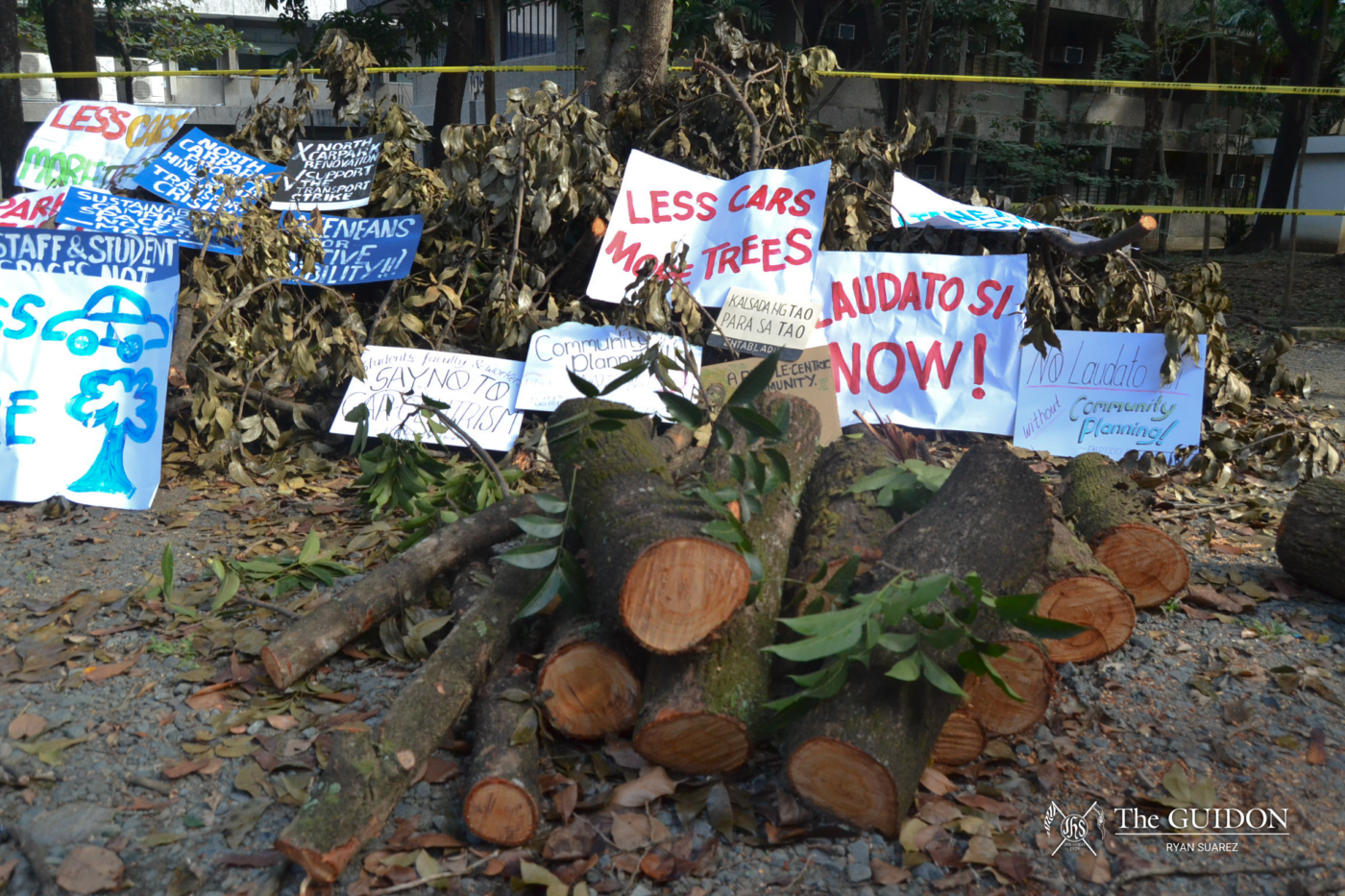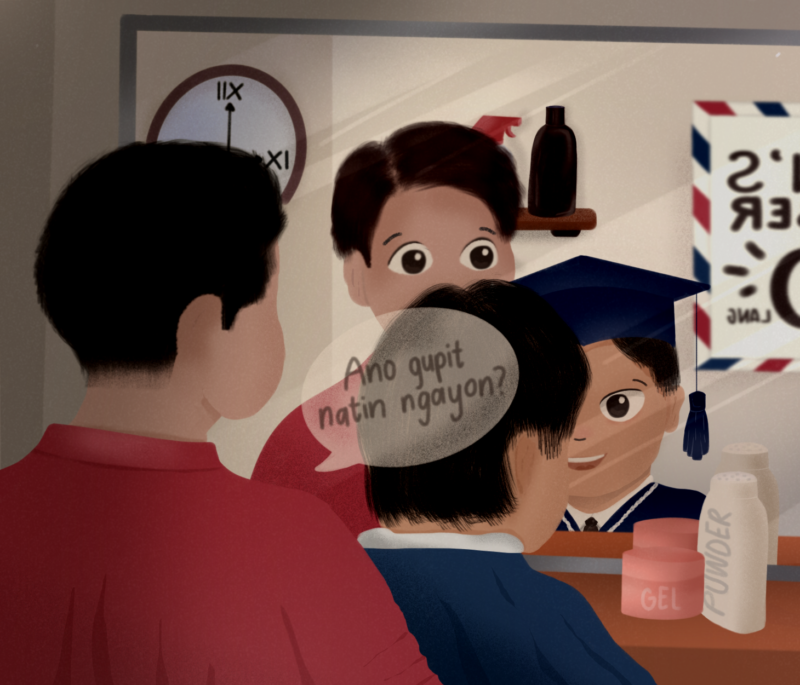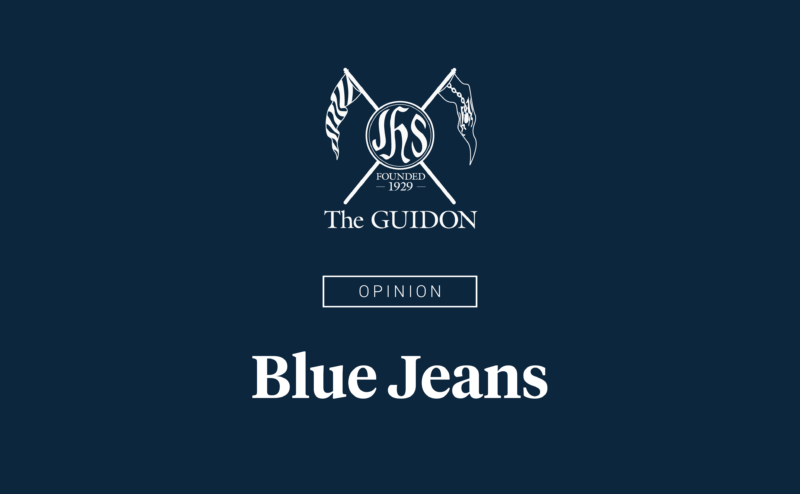DESPITE THE Christmas break, the Ateneo community expressed disapproval through a discreetly organized protest on campus last December 27, highlighting concerns about the administration’s lack of stakeholder consultations and the University’s car-centric priorities.
Even with resistance from security personnel, the assembly still proceeded with a tree ribbon-tying ceremony at the construction site, followed by a message-sharing at the Leong Hall Lobby.

Announced last December 21, the renovations aim to address problems of the car park’s uneven roads and insufficient parking slots within the campus. However, the administration also cited that 82 trees will be removed from the area. Additionally, they revealed these decisions during the Christmas break, with only a few stakeholders knowledgeable of the discussions prior to the announcement.
In response, on December 26, key faculty members and students from the Higher Education Cluster issued an open letter that urged University President Roberto Yap, SJ to reconsider the project. As of writing, there are over 1,000 individuals who have signed the petition.
Leading the appeal are former Ateneo School of Government Dean Antonio La Viña, JSD, and tenured professors Mary Racelis, PhD, and Remmon Barbaza, PhD—among which are notable faculty members that also took a stand against the similar SOM Forest diversion road project in 2018.
Similarly, Blue Mobility (BlueMob), along with 19 other student-led groups also released a separate joint statement opposing the project for its “counterproductive approach in addressing persistent issues, environmental sustainability, and the lack of stakeholder participation.”
Underlying problems

While separate, both the open letter and joint statements stress similar calls for people-centric mobility and the creation of “more green spaces for community congregation” to reduce traffic within the campus.
Aside from this, both statements take issue with the lack of stakeholder representation and transparency in the conducted decision-making process. Particularly, the statements cite that the timing of the decision’s release—during the Christmas break—may have been a deliberate choice to weaken the community’s response to the renovation.
Currently serving as the Manila Observatory’s Associate Director for Climate Policy and International Relations, La Viña specifically shared how the faculty was not made aware of the decision nor the talks about it until after the decision was posted online.
“I would have thought that they [would consult] the whole community. They said they consulted some people, [but it’s] not enough,” La Viña lamented.
Looking to improve clarity regarding the project, La Viña, Barbaza, Racelis, and other faculty members met with Vice President of Administration Rodolfo Ang and Assunta Cuyegkeng, PhD, former Director of the Ateneo Institute of Sustainability (AIS) last December 23 to facilitate a more in-depth discussion and explanation of the project.
Barbaza disclosed that the AIS denied allegations of avoiding feedback in the meeting, but admitted that their consultations may have been inadequate. “[The AIS] found it unfair that people were saying it was a ‘done deal.’ Sabi nila, hindi pa (They said it’s not yet [a done deal]),” he said.
In addition, La Viña—also a former Department of Environment and Natural Resources (DENR) Undersecretary—openly criticized the policy of replacing each tree cut with 50 seedlings as “faulty” given that each seedling must be “protected and managed for them to grow [into] forests.” He elaborated that seedlings cannot replace mature trees, as they are frequently planted in neglected areas where they cannot survive.
Unheard alternatives

In place of the intended renovations, La Viña proposed that the area should instead be transformed into a park rather than a parking lot. He added that the area should be open to the students, drivers, and alumni.
Given the car-driven mobilization problems within the campus, BlueMob has also been at the forefront of advocating for more inclusive and sustainable options such as carpooling, cycling, and utilizing public transportation.
Maxine Cuartero and Jericho Urquiola, BlueMob’s President and Executive Vice President respectively, shared that the organization could have offered valuable recommendations regarding the issues at hand.
“Mobility cuts across sectors, scales, advocacies, and disciplines, so it’s necessary to bring together the University’s diverse stakeholders and weave themselves into the discussion,” Urquiola said.
Similarly, Ateneo Environmental Science Society President Harley Legaspi mentioned that culling and rehabilitating the trees should be a different project in itself. Legaspi further explained that addressing the issues caused by invasive species is time-consuming—thus, a new and carefully deliberated initiative must be explored.
While many have already spoken out, La Viña suggested a moratorium period for the renovations, as a way for all stakeholders to properly and collectively discuss the plan of action and be heard by the administration.
Call for admin response
Although the renovations have already begun, La Viña encourages the community to keep on letting their voices be heard regarding the issue. He also added that if the administration fails to address the issue, the clamor for reconsiderations is bound to carry over to the beginning of the second semester.
“[Some trees are] still not cut so we asserted our right [to assemble] and we succeeded in doing that—and we should keep on doing that in the days to come. Embers lang ito (These rallies are just embers). There will be a fire raging on this in January,” he said.
In addressing the issue of car-centrism, Barbaza brought up that the University should take the initiative to transform Katipunan into a walkable space. “We are complicit. We are exacerbating the problem. Ateneo should lead the way. […] Ang daming pwedeng gawin (A lot more can be done),” he stated.
Echoing the statements both professors had, alumni also shared their insights on social media platforms. Notably, TJ Alcantara (AB POS ‘23, MA PM ‘24) expressed his apprehension over the project, stating that though invasive trees are to be cut, the administration’s motivation behind it is doing so “just to improve a car park.”
In addition, Senator Risa Hontiveros (AB Social Sciences ‘87) also called for better solutions to alleviate campus traffic, reminiscing about sustainable alternatives to car-centrism such as carpooling and the use of public transportation.
Similarly, Cristina Batalla (AB DS ‘21), a Move as One Coalition member, urged the University to adopt more sustainable strategies, including reviving the carpool program, creating commute guides, and promoting active mobility like cycling, walking, and scooter use. She also proposed reinstating Ateneo’s P2P+ shuttle services, a former university initiative to reduce the volume of vehicles on campus.
To direct the flow of discussions and feedback from the student body, the Sanggunian has opened a discussion thread in the One Big Forum Facebook group. Here, the Ateneo community is encouraged to share their opinions and engage in discourse with others.
With reports by Regina Manalo






